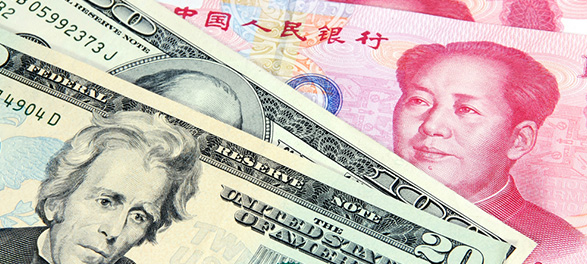
Over the last few months, speculation has slowly turned to fact, as reports about China and Russia’s desires to see the U.S. dollar dethroned as the world’s reserve currency have proved to be true. China has even gone so far as to call for the “de-Americanization” of the world in its attempts to push its currency to the top spot.
Just a few months ago, China released a statement claiming that, “The world is still crawling its way out of an economic disaster thanks to the voracious Wall Street elites. Such alarming days when the destinies of others are in the hands of a hypocritical nation have to be terminated.”
As a follow up, the Chinese news agency, Xinhua, released a statement calling for the establishment of a new international reserve currency to replace the U.S. dollar “so that the international community could permanently stay away from the spillover of the intensifying domestic political turmoil in the United States.”
Now, according to CNBC, a survey of 200 institutional investors published by State Street and the Economist Intelligence Unit is showing that “53 percent of investors think the renminbi [yuan] will surpass the U.S. dollar as the world’s major reserve currency.”
A report accompanying the survey summarized the results: “As China’s economic influence grows, the global importance of the renminbi will become magnified. Indeed, while for decades it has been a ‘greenback world,’ dominated by the U.S. dollar as the world’s primary reserve currency, many think a ‘redback world,’ in which the renminbi enjoys premier status, is increasingly a possibility.”
These results may come as a shock to the general public, but those in the know have seen the writing on the wall for some time now. European Central Bank Executive Board member Yves Mersch told CNBC a day before the survey was released that “China’s yuan is gaining importance in international trade and investment and might ultimately challenge the U.S. dollar.”
It is not going to be an easy road to the top for the yuan, however. The Chinese government will have to drastically change their financial policies, allowing for more transparency. CNBC suggests such options as decreasing exchange-rate intervention, liberalizing interest rates, and relaxing restrictions on capital flows.
A big argument against the yuan surpassing the dollar has been its lack of liquidity across all asset classes. CNBC reports, however, that “Recent moves in the yuan have triggered speculation that the People’s Bank of China is getting ready to widen its trading band – which would be a step towards liberalizing the Chinese currency. The yuan is currently allowed to rise or fall by 1 percent in either direction from a level fixed against the dollar each day by the country’s central bank.”
Despite its history, investors seem to feel that China is willing to go the extra mile if that is what it takes. In the survey, 66% of respondents feel that China is only a decade away from liberalizing its financial policies enough to allow for the yuan to surpass the dollar. The majority of this group feels that this liberalization will take place in the less than five years.
China has attempted to travel down the liberalization road before, with mixed results. In 2009, the government decided to allow cross-border trade settlement in renminbi in order to ease the process of listing offshore bonds. Most investors feel that these reforms are still “limited in scope,” because of the strict quotas for how much currency can move across the border.
China will have to go much further out of its comfort zone if it hopes to get the backing needed to knock the dollar off the top spot. If recent reports are to be believed, however, then big changes could be making headlines in the not too distant future.

